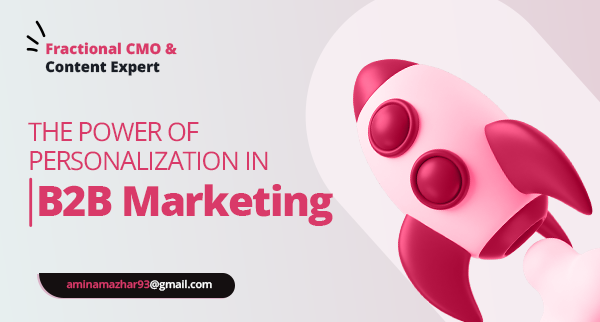by Amina Mazhar
In the ever-evolving landscape of B2B marketing, the role of personalization has grown significantly in recent years. Gone are the days of one-size-fits-all marketing strategies. Today, businesses are recognizing the power of personalization in reaching their target audience effectively and building lasting relationships. In this article, we’ll explore the use of personalization in B2B marketing and why it’s a game-changer.
Tailoring Content and Messaging:
Personalization in B2B marketing involves tailoring content and messaging to resonate with specific individuals or companies. This customization can take various forms, such as addressing recipients by their names in emails, offering content that aligns with their industry, or acknowledging their previous interactions with your brand. By doing so, you create a more engaging and relevant experience for your prospects, increasing the likelihood of capturing their attention.
Enhancing Customer Relationships:
B2B marketing is not just about acquiring new customers; it’s equally important to maintain and nurture existing relationships. Personalization plays a crucial role in this aspect by showing your clients that you understand their needs and preferences. Sending personalized recommendations, updates, and exclusive offers can go a long way in strengthening your bonds with clients, fostering loyalty, and ultimately driving repeat business.
Account-Based Marketing (ABM):
Account-Based Marketing has gained immense popularity in B2B circles, and personalization is at its core. ABM focuses on tailoring marketing efforts to specific target accounts or companies, rather than casting a wide net. By crafting personalized campaigns for each target account, B2B marketers can create a highly relevant and compelling experience that resonates with decision-makers, increasing the chances of conversion.
Data-Driven Insights:
The rise of data analytics and marketing automation tools has made personalization more accessible than ever. These tools enable businesses to collect, analyze, and leverage data to create highly targeted marketing campaigns. By understanding the behavior and preferences of their audience, B2B marketers can deliver the right content, at the right time, through the right channels, maximizing the impact of their efforts.
Competitive Advantage:
Personalization in B2B marketing can set your business apart from the competition. When prospective clients receive personalized communications, they are more likely to view your brand as attentive, knowledgeable, and trustworthy. This positive perception can be a powerful differentiator, especially in industries with intense competition.
Adaptability and Flexibility:
The B2B landscape is dynamic, with market conditions, customer preferences, and industry trends constantly evolving. Personalization allows businesses to adapt quickly to these changes. By analyzing customer data and feedback, B2B marketers can adjust their strategies and offerings to stay aligned with the evolving needs of their target audience.
Conclusion:
In conclusion, personalization has become an indispensable tool in the arsenal of B2B marketers. By tailoring content, enhancing relationships, embracing ABM, leveraging data, gaining a competitive edge, and remaining adaptable, businesses can harness the power of personalization to drive success in an increasingly competitive market. As B2B marketing continues to evolve, those who embrace and master personalization will be well-positioned to thrive and build lasting customer relationships.
